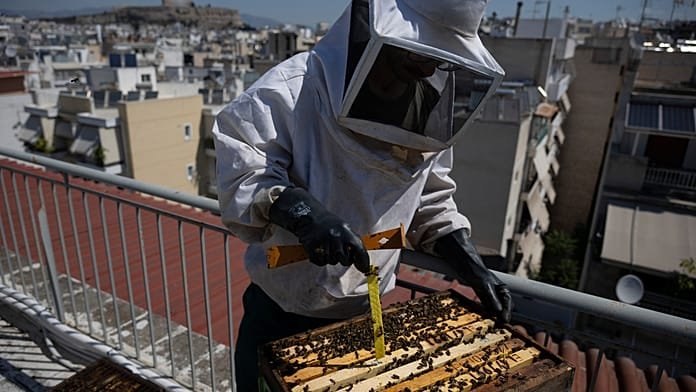06/10/2025 – 7:00 GMT+2
Nikos Chatzilias extracted 500 kilograms of honey this year from approximately 1.2 million bees, spread out across 30 hives on 7 rooftops.
ADVERTISEMENT
With the need for natural food products constantly increasing, some Athenians decided to take matters into their own hands and in an original way.
Many residents of the Greek capital are now voluntarily looking after beehives on the rooftops of their apartment buildings in the centre of Athens.
Nikos Chatzilias spends his days taking care of those bee colonies, and it all started with a test.
“We brought two beehives home that needed a bit of extra care. I wanted to try out what urban beekeeping was like. I saw that it worked out really well for the hives. For us, the daily contact with the bees brought us a lot of joy, and that’s why we continued,” said Chatzilias.
Despite the growing interest, beekeeping in the city centre has its obstacles. This is because residents often object, as they fear the bees will sting them. However, there are many who promote the initiative and advocate for the benefits of urban beekeeping.
“When I was in school and we were learning about beehives, I really liked the idea of having my own,” said Aggelina Chatzistavrou, a beehive host.
“I think it’s also good for the environment, because bees are declining. So, if everyone could have a hive in an open space at their home, I believe it would change our environment in a big way,” she added.
This summer, Chatzilias took care of 30 hives that he placed on seven rooftops in the Athens area – including one with a view of the Parthenon. He first embarked on this journey three years ago, and is happy the practice is finally gaining some momentum.
“After three years of our presence, talking about this, people have started to want to do this. They contact us specifically for this reason — to set up beehives in the city. So yes, there is interest.”
His approximately 1.2 million bees have produced 500 kilograms of honey. Each batch is packaged and named after its region of origin. The Athenian beekeeper’s goal is to get other interested parties into urban beekeeping.
“Bees know how to do their job very well. We don’t teach them anything. We don’t really direct them anywhere. We just make sure they have the necessary conditions so they can do what they already know how to do so well,” noted Chatzilias.
A major challenge of urban beekeeping is getting the hives up the stairs of buildings in the spring and down them before winter, often passing through people’s homes to get to the roofs.
Chatzilias says the spike in interest is a sign of hope that nature will continue to have its place, as bustling cities and metropolitans continue to rapidly urbanise.
“For me, what this means is hope — that even with a chaotic urban environment that we’ve created, nature — or whatever remains of it in the city — still responds and can give life.”
And residents, embarking on these new journeys, are also very plased with the results. They say the honey the bees on their rooftops produce, is far superior to offerings available at their local supermarket, and motivates them to continue with this initiative.
“It is completely different from the other honeys. We’re not talking about honeys from the supermarkets, this doesn’t have anything to do with that,” said George Karras, an Athenian beehive host.
“No comparison. But, even when I have tasted the honey from the countryside, from other producers, personally, the taste for me is exactly what I want. It’s not too sweet. It’s very, very nice,” he continued.
Chatzilias says the Greek capital offers a unique opportunity for those interested in urban beekeeping. The city boasts pollinator plants all year which, according to Chatzilias, makes it an “ideal setting” for this year-round experiment.
He’s hoping the months and years to come will continue to pique people’s interest in this rather small, but hugely beneficial initiative for the betterment of the environment.








